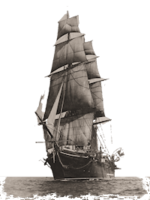March 14th. This morning at five thirty, called all hands to up anchor, signalized the fleet to get under way, started ahead, ran some distance further up the river, came in sight of the batteries at Port Hudson; at seven thirty A. M., brought ship to anchor; the whole fleet came to anchor at the same time. Here we are able to command a view of the enemy’s batteries; we are lying within four miles of them, just out of range of their guns. The mortar schooners are lying about one mile ahead of our ships, under cover of a point of land; in this position they will bombard the enemy; it is quite probable that an attack will be made to-night. This afternoon an officer came on board with dispatches from Gen. Banks. The mortars have opened fire upon the batteries, simply to get range. Another rebel steamer came down the river this afternoon, making five in all; they lay under cover of the batteries.
It is now decided to make an attack to-night. We took the small gunboat Albatross in tow; she was made fast to our port quarter. The Richmond and Monongahela had, each of them, a gunboat made fast to them also. This was done after dark, so that the enemy could not see our movements; at nine P. M., everything being in readiness, signals were made for the whole fleet to get under way, and follow us up; we beat to quarters, and waited for the fleet to form in line of battle. A very few minutes elapsed before we were all in motion, each vessel taking its respective station; at ten P. M., the tugboat Reliance came up with despatches for the Admiral; spoke, and sent her back to hasten the rear ships; at ten thirty Richmond reported rear ships moving up to station; we moved along very slowly and very cautiously; the night being so very dark, we endeavored to approach the enemy as near as possible without being seen. As soon as we were discovered, the enemy opened their batteries upon us. It was some time before we could get any of our guns to bear; as a matter of course, we were obliged to stand and take it; however, we kept on our course with but one object in view, “conquer or die.” After being under fire of the enemy’s guns for some time, we succeeded in getting our guns to bear, then the firing became general and fearful in the extreme; our ships were all in full blast. In the meantime, the mortar vessels, six in number, let drive their missiles of death. By this time, our ships had got right under the batteries, and in the thickest of the firing. Unfortunately we ran aground; it was not long, however, before we were afloat again, as full steam was applied, and we succeeded in backing off; the enemy, in the meantime, did their utmost to destroy our noble ship.
We were under fire of the enemy’s guns one hour and ten minutes; our ship sustained more damage in this battle than any other we have been in yet. After we had passed by the batteries, our first duty was to ascertain the fate of our fleet; as it was so intensely dark, it was impossible to see the length of the ship from us; not many minutes elapsed before we were informed that the Hartford, and the gunboat which we had in tow, were the only vessels out of the whole fleet that had succeeded in passing by the batteries. We passed on out of range of their guns, and brought ship to anchor. What had become of the balance of our fleet, was now a mystery to us. It was very evident that our ships had met with a serious fate, or else some of them would have passed by. We could see from our anchorage a large fire raging below the batteries, supposed to be the side-wheel steamer Mississippi, from which a frequent number of explosions were heard.
